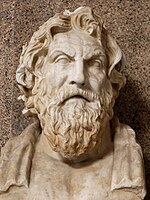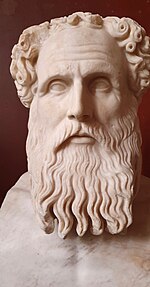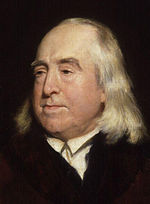Meaning of life

The meaning of life pertains to the
The meaning of life can be derived from philosophical and religious contemplation of, and scientific inquiries about,
Origin of the expression

The first English use of the expression "meaning of life" appears in
Origin of the question

Arthur Schopenhauer was the first to explicitly ask the question,[1] in an essay entitled "Character".
Since a man does not alter, and his moral character remains absolutely the same all through his life; since he must play out the part which he has received, without the least deviation from the character; since neither experience, nor philosophy, nor religion can effect any improvement in him, the question arises, What is the meaning of life at all? To what purpose is it played, this farce in which everything that is essential is irrevocably fixed and determined?[5]
Questions about the meaning of life, and similar, have been expressed in a broad variety of other ways, including:
- What is the meaning of life? What's it all about? Who are we?[6][7][8]
- Why are we here? What are we here for?[9][10][11]
- What is the origin of life?[12]
- What is the nature of life? What is the nature of reality?[12][13][14]
- What is the purpose of life? What is the purpose of one's life?[13][15][16]
- What is the significance of life?[16] (See also #Psychological significance and value in life)
- What is meaningful and valuable in life?[17]
- What is the value of life?[18]
- What is the reason to live? What are we living for?[11][19]
These questions have resulted in a wide range of competing answers and explications, from
Scientific inquiry and perspectives
Many members of the scientific community and philosophy of science communities think that science can provide the relevant context, and set of parameters necessary for dealing with topics related to the meaning of life. In their view, science can offer a wide range of insights on topics ranging from the science of happiness to death anxiety. Scientific inquiry facilitates this through nomological investigation into various aspects of life and reality, such as the Big Bang, the origin of life, and evolution, and by studying the objective factors which correlate with the subjective experience of meaning and happiness.
Psychological significance and value in life
Researchers in positive psychology study empirical factors that lead to life satisfaction,[20] full engagement in activities,[21] making a fuller contribution by using one's personal strengths,[22] and meaning based on investing in something larger than the self.[23] Large-data studies of flow experiences have consistently suggested that humans experience meaning and fulfillment when mastering challenging tasks and that the experience comes from the way tasks are approached and performed rather than the particular choice of task. For example, flow experiences can be obtained by prisoners in concentration camps with minimal facilities, and occur only slightly more often in billionaires. A classic example[21] is of two workers on an apparently boring production line in a factory. One treats the work as a tedious chore while the other turns it into a game to see how fast he/she can make each unit and achieves flow in the process.
Neuroscience describes reward, pleasure, and motivation in terms of neurotransmitter activity, especially in the limbic system and the ventral tegmental area in particular. If one believes that the meaning of life is to maximize pleasure and to ease general life, then this allows normative predictions about how to act to achieve this. Likewise, some ethical naturalists advocate a science of morality—the empirical pursuit of flourishing for all conscious creatures.
Alongside this, there are a number of theories about the way in which humans evaluate the positive and negative aspects of their existence and thus the value and meaning they place on their lives. For example, depressive realism posits an exaggerated positivity in all except those experiencing depressive disorders who see life as it truly is, and David Benatar theorises that more weight is generally given to positive experiences, providing bias towards an over-optimistic view of life.
Emerging research shows that meaning in life predicts better physical health outcomes. Greater meaning has been associated with a reduced risk of Alzheimer's disease,[26][27] reduced risk of heart attack among individuals with coronary heart disease,[28] reduced risk of stroke,[29] and increased longevity in both American and Japanese samples.[30] There is also growing evidence for a small decline in purpose in life in the early stages of cognitive impairment.[31]
In 2014, the British National Health Service began recommending a five-step plan for mental well-being based on meaningful lives, whose steps are:[32]
- Connect with community and family
- Physical exercise
- Lifelong learning
- Giving to others
- Mindfulness of the world around you
Origin and nature of biological life

The exact mechanisms of
Though scientists have intensively studied life on Earth, defining life in unequivocal terms is still a challenge.[37][38] Physically, one may say that life "feeds on negative entropy"[39][40][41] which refers to the process by which living entities decrease their internal entropy at the expense of some form of energy taken in from the environment.[42][43][44] Biologists generally agree that lifeforms are self-organizing systems which regulate their internal environments as to maintain this organized state, metabolism serves to provide energy, and reproduction causes life to continue over a span of multiple generations. Typically, organisms are responsive to stimuli and genetic information changes from generation to generation, resulting in adaptation through evolution; this optimizes the chances of survival for the individual organism and its descendants respectively.[45]
Non-cellular replicating agents, notably
Origins and ultimate fate of the universe
Though the Big Bang theory was met with much skepticism when first introduced, it has become well-supported by several independent observations.[46] However, current physics can only describe the early universe from around 10−43 seconds after the Big Bang (where zero time corresponds to infinite temperature); a theory of quantum gravity would be required to understand events before that time. Nevertheless, many physicists have speculated about what would have preceded this limit, and how the universe came into being.[47] For example, one interpretation is that the Big Bang occurred coincidentally, and when considering the anthropic principle, it is sometimes interpreted as implying the existence of a multiverse.[48]
The ultimate fate of the universe, and implicitly of humanity, is hypothesized as one in which biological life will eventually become unsustainable, such as through a
Theoretical
Scientific questions about the mind
The nature and origin of

On the other hand, some scientists, like Andrei Linde, have considered that consciousness, like spacetime, might have its own intrinsic degrees of freedom, and that one's perceptions may be as real as (or even more real than) material objects.[54] Hypotheses of consciousness and spacetime explain consciousness in describing a "space of conscious elements",[54] often encompassing a number of extra dimensions.[55] Electromagnetic theories of consciousness solve the binding problem of consciousness in saying that the electromagnetic field generated by the brain is the actual carrier of conscious experience; there is however disagreement about the implementations of such a theory relating to other workings of the mind.[56][57] Quantum mind theories use quantum theory in explaining certain properties of the mind. Explaining the process of free will through quantum phenomena is an alternative to determinism.
Parapsychology
Based on the premises of non-materialistic explanations of the mind, some have suggested the existence of a
Nature of meaning in life
Reker and Wong define personal meaning as the "cognizance of order, coherence and purpose in one's existence, the pursuit and attainment of worthwhile goals, and an accompanying sense of fulfillment" (p. 221).[64] In 2016, Martela and Steger defined meaning as coherence, purpose, and significance.[65] In contrast, Wong has proposed a four-component solution to the question of meaning in life,[66][67] with the four components purpose, understanding, responsibility, and enjoyment (PURE):
- You need to choose a worthy purpose or a significant life goal.
- You need to have sufficient understanding of who you are, what life demands of you, and how you can play a significant role in life.
- You and you alone are responsible for deciding what kind of life you want to live, and what constitutes a significant and worthwhile life goal.
- You will enjoy a deep sense of significance and satisfaction only when you have exercised your responsibility for self-determination and actively pursue a worthy life-goal.
Thus, a sense of significance permeates every dimension of meaning, rather than standing as a separate factor.
Although most psychology researchers consider meaning in life as a subjective feeling or judgment, most philosophers (e.g., Thaddeus Metz, Daniel Haybron) propose that there are also objective, concrete criteria for what constitutes meaning in life.[68][69] Wong has proposed that whether life is meaningful depends not only on subjective feelings but, more importantly, on whether a person's goal-striving and life as a whole is meaningful according to some objective normative standard.[67]
Western philosophical perspectives
The philosophical perspectives on the meaning of life are those ideologies that explain life in terms of ideals or abstractions defined by humans.
Ancient Greek philosophy

Platonism
In
Aristotelianism
Every skill and every inquiry, and similarly, every action and choice of action, is thought to have some good as its object. This is why the good has rightly been defined as the object of all endeavor [...]
Everything is done with a goal, and that goal is "good".— Nicomachean Ethics 1.1
Yet, if action A is done towards achieving goal B, then goal B also would have a goal, goal C, and goal C also would have a goal, and so would continue this pattern, until something stopped its
What is the highest good in all matters of action? To the name, there is an almost complete agreement; for uneducated and educated alike call it happiness, and make happiness identical with the good life and successful living. They disagree, however, about the meaning of happiness.
— Nicomachean Ethics 1.4
Cynicism

The Cynical life rejects conventional desires for
Cyrenaicism
Epicureanism
"When we say ... that pleasure is the end and aim, we do not mean the pleasures of the prodigal or the pleasures of sensuality, as we are understood to do, by some, through ignorance, prejudice or willful misrepresentation. By pleasure, we mean the absence of pain in the body and of trouble in the soul. It is not by an unbroken succession of drinking bouts and of revelry, not by sexual lust, nor the enjoyment of fish, and other delicacies of a luxurious table, which produce a pleasant life; it is sober reasoning, searching out the grounds of every choice and avoidance, and banishing those beliefs through which the greatest tumults take possession of the soul."[74]
The Epicurean meaning of life rejects immortality and mysticism; there is a soul, but it is as mortal as the body. There is no afterlife, yet, one need not fear death, because "Death is nothing to us; for that which is dissolved, is without sensation, and that which lacks sensation is nothing to us."[75]
Stoicism

Stoicism's prime directives are virtue, reason, and natural law, abided to develop personal self-control and mental fortitude as means of overcoming destructive emotions. The Stoic does not seek to extinguish emotions, only to avoid emotional troubles, by developing clear judgment and inner calm through diligently practiced logic, reflection, and concentration.
The Stoic ethical foundation is that "good lies in the state of the soul", itself, exemplified in wisdom and self-control, thus improving one's spiritual well-being: "Virtue consists in a will which is in agreement with Nature."[75] The principle applies to one's personal relations thus: "to be free from anger, envy, and jealousy".[75]
Enlightenment philosophy
The Enlightenment and the colonial era both changed the nature of European philosophy and exported it worldwide. Devotion and subservience to God were largely replaced by notions of inalienable natural rights and the potentialities of reason, and universal ideals of love and compassion gave way to civic notions of freedom, equality, and citizenship.
The meaning of life changed as well, focusing less on humankind's relationship to God and more on the relationship between individuals and their society. This era is filled with theories that equate meaningful existence with the social order.
Kantianism

Simply put, the test is that one must universalize the maxim (imagine that all people acted in this way) and then see if it would still be possible to perform the maxim in the world without contradiction. In Groundwork, Kant gives the example of a person who seeks to borrow money without intending to pay it back. This is a contradiction because if it were a universal action, no person would lend money anymore as he knows that he will never be paid back. The maxim of this action, says Kant, results in a contradiction in conceivability (and thus contradicts perfect duty).
Kant also denied that the consequences of an act in any way contribute to the moral worth of that act, his reasoning being that the physical world is outside one's full control and thus one cannot be held accountable for the events that occur in it.
19th-century philosophy
The first English use of the expression "meaning of life" appeared in Thomas Carlyle's Sartor Resartus (1833–August 1834): "Our Life is compassed round with Necessity; yet is the meaning of Life itself no other than Freedom, than Voluntary Force: thus have we a warfare; in the beginning, especially, a hard-fought battle."[76]
Utilitarianism

The origins of
Jeremy Bentham's foremost proponent was James Mill, a significant philosopher in his day, and father of John Stuart Mill. The younger Mill was educated per Bentham's principles, including transcribing and summarizing much of his father's work.[78]
Nihilism
Nihilism suggests that life is without objective meaning.
Friedrich Nietzsche characterized nihilism as emptying the world, and especially human existence, of meaning, purpose, comprehensible truth, and essential value; succinctly, nihilism is the process of "the devaluing of the highest values".[79] Seeing the nihilist as a natural result of the idea that God is dead, and insisting it was something to overcome, his questioning of the nihilist's life-negating values returned meaning to the Earth.[80]
To
If God, as the supra-sensory ground and goal, of all reality, is dead; if the supra-sensory world of the Ideas has suffered the loss of its obligatory, and above it, its vitalizing and up-building power, then nothing more remains to which Man can cling, and by which he can orient himself.
The End of the Worldby John Martin
The French philosopher Albert Camus asserts that the absurdity of the human condition is that people search for external values and meaning in a world which has none and is indifferent to them. Camus writes of value-nihilists such as Meursault,[82] but also of values in a nihilistic world, that people can instead strive to be "heroic nihilists", living with dignity in the face of absurdity, living with "secular saintliness", fraternal solidarity, and rebelling against and transcending the world's indifference.[83]
20th-century philosophy
The current era has seen radical changes in both formal and popular conceptions of human nature. The knowledge disclosed by modern science has effectively rewritten the relationship of humankind to the natural world. Advances in medicine and technology have freed humans from significant limitations and ailments of previous eras;[84] and philosophy—particularly following the linguistic turn—has altered how the relationships people have with themselves and each other are conceived. Questions about the meaning of life have also seen radical changes, from attempts to reevaluate human existence in biological and scientific terms (as in pragmatism and logical positivism) to efforts to meta-theorize about meaning-making as a personal, individual-driven activity (existentialism, secular humanism).
Pragmatism
Pragmatism originated in the late-19th-century US, concerning itself (mostly) with truth, and positing that "only in struggling with the environment" do data, and derived theories, have meaning, and that consequences, like utility and practicality, are also components of truth. Moreover, pragmatism posits that anything useful and practical is not always true, arguing that what most contributes to the most human good in the long course is true. In practice, theoretical claims must be practically verifiable, i.e. one should be able to predict and test claims, and, that, ultimately, the needs of humankind should guide human intellectual inquiry.
Pragmatic philosophers suggest that the practical, useful understanding of life is more important than searching for an impractical abstract truth about life. William James argued that truth could be made, but not sought.[85][86] To a pragmatist, the meaning of life is discoverable only via experience.
Theism
Theists believe God created the universe and that God had a purpose in doing so. Theists also hold the view that humans find their meaning and purpose for life in God's purpose in creating. Some theists further hold that if there were no God to give life ultimate meaning, value, and purpose, then life would be absurd.[87]
Existentialism
According to existentialism, each person creates the essence (meaning) of their life; life is not determined by a supernatural god or an earthly authority, one is free. As such, one's ethical prime directives are action, freedom, and decision, thus, existentialism opposes
Søren Kierkegaard spoke about a "leap", arguing that life is full of absurdity, and one must make his and her own values in an indifferent world. One can live meaningfully (free of despair and anxiety) in an unconditional commitment to something finite and devotes that meaningful life to the commitment, despite the vulnerability inherent to doing so.[88]
Arthur Schopenhauer answered: "What is the meaning of life?" by stating that one's life reflects one's will, and that the will (life) is an aimless, irrational, and painful drive. Salvation, deliverance, and escape from suffering are in aesthetic contemplation, sympathy for others, and asceticism.[89][90]
For Friedrich Nietzsche, life is worth living only if there are goals inspiring one to live. Accordingly, he saw nihilism ("all that happens is meaningless") as without goals. He stated that asceticism denies one's living in the world; stated that values are not objective facts, that are rationally necessary, universally binding commitments: our evaluations are interpretations, and not reflections of the world, as it is, in itself, and, therefore, all ideations take place from a particular perspective.[80]
Absurdism
"... in spite of or in defiance of the whole of existence he wills to be himself with it, to take it along, almost defying his torment. For to hope in the possibility of help, not to speak of help by virtue of the absurd, that for God all things are possible—no, that he will not do. And as for seeking help from any other—no, that he will not do for all the world; rather than seek the help he would prefer to be himself—with all the tortures of hell if so it must be."
In absurdist philosophy, the Absurd arises out of the fundamental disharmony between the individual's search for meaning and the apparent meaninglessness of the universe. As beings looking for meaning in a meaningless world, humans have three ways of resolving the dilemma. Kierkegaard and Camus describe the solutions in their works,
- Suicide (or, "escaping existence"): a solution in which a person simply ends one's own life. Both Kierkegaard and Camus dismiss the viability of this option.
- Religious belief in a transcendent realm or being: a solution in which one believes in the existence of a reality that is beyond the Absurd, and, as such, has meaning. Kierkegaard stated that a belief in anything beyond the Absurd requires a non-rational but perhaps necessary religious acceptance in such an intangible and empirically unprovable thing (now commonly referred to as a "leap of faith"). However, Camus regarded this solution as "philosophical suicide".
- Acceptance of the Absurd: a solution in which one accepts and even embraces the Absurd and continues to live in spite of it. Camus endorsed this solution (notably in his 1947 allegorical novel The Plague or La Peste), while Kierkegaard regarded this solution as "demoniac madness": "He rages most of all at the thought that eternity might get it into its head to take his misery from him!"[92]
Secular humanism

Per secular humanism, the human species came to be by reproducing successive generations in a progression of unguided evolution as an integral expression of nature, which is self-existing.[93][94] Human knowledge comes from human observation, experimentation, and rational analysis (the scientific method), and not from supernatural sources; the nature of the universe is what people discern it to be.[93] Likewise, "values and realities" are determined "by means of intelligent inquiry"[93] and "are derived from human need and interest as tested by experience", that is, by critical intelligence.[95][96] "As far as we know, the total personality is [a function] of the biological organism transacting in a social and cultural context."[94]
People determine human purpose without supernatural influence; it is the human personality (general sense) that is the purpose of a human being's life which humanism seeks to develop and fulfill:[93] "Humanism affirms our ability and responsibility to lead ethical lives of personal fulfillment that aspire to the greater good of humanity".[95] Humanism aims to promote enlightened self-interest and the common good for all people. It is based on the premises that the happiness of the individual person is inextricably linked to the well-being of all humanity, in part because humans are social animals who find meaning in personal relations and because cultural progress benefits everybody living in the culture.[94][95]
The philosophical subgenres
From a humanism-psychotherapeutic point of view, the question of the meaning of life could be reinterpreted as "What is the meaning of my life?"[98] This approach emphasizes that the question is personal—and avoids focusing on cosmic or religious questions about overarching purpose. There are many therapeutic responses to this question. For example, Viktor Frankl argues for "Dereflection", which translates largely as to cease endlessly reflecting on the self; instead, engage in life. On the whole, the therapeutic response is that the question itself—what is the meaning of life?—evaporates when one is fully engaged in life. (The question then morphs into more specific worries such as "What delusions am I under?"; "What is blocking my ability to enjoy things?"; "Why do I neglect loved-ones?".)[99]
Logical positivism
The things (people, events) in the life of a person can have meaning (importance) as parts of a whole, but a discrete meaning of (the) life, itself, aside from those things, cannot be discerned. A person's life has meaning (for themselves, others) as the life events resulting from their achievements, legacy, family, etc., but, to say that life, itself, has meaning, is a misuse of language, since any note of significance, or of consequence, is relevant only in life (to the living), so rendering the statement erroneous. Bertrand Russell wrote that although he found that his distaste for torture was not like his distaste for broccoli, he found no satisfactory, empirical method of proving this:[75]
When we try to be definite, as to what we mean when we say that this or that is "the Good," we find ourselves involved in very great difficulties. Bentham's creed, that pleasure is the Good, roused furious opposition, and was said to be a pig's philosophy. Neither he nor his opponents could advance any argument. In a scientific question, evidence can be adduced on both sides, and, in the end, one side is seen to have the better case—or, if this does not happen, the question is left undecided. But in a question, as to whether this, or that, is the ultimate Good, there is no evidence, either way; each disputant can only appeal to his own emotions, and employ such rhetorical devices as shall arouse similar emotions in others ... Questions as to "values"—that is to say, as to what is good or bad on its own account, independently of its effects—lie outside the domain of science, as the defenders of religion emphatically assert. I think that, in this, they are right, but, I draw the further conclusion, which they do not draw, that questions as to "values" lie wholly outside the domain of knowledge. That is to say, when we assert that this, or that, has "value", we are giving expression to our own emotions, not to a fact, which would still be true if our personal feelings were different.[103]
Postmodernism
Postmodernist thought—broadly speaking—sees human nature as constructed by language, or by structures and institutions of human society. Unlike other forms of philosophy, postmodernism rarely seeks out
Naturalistic pantheism
According to naturalistic pantheism, the meaning of life is to care for and look after nature and the environment.
Embodied cognition
Embodied cognition uses the neurological basis of emotion, speech, and cognition to understand the nature of thought. Cognitive neuropsychology has identified brain areas necessary for these abilities, and genetic studies show that the gene FOXP2 affects neuroplasticity which underlies language fluency.
East Asian philosophical perspectives
Mohism
The Mohist philosophers believed that the purpose of life was universal, impartial
Confucianism
Legalism
The Legalists believed that finding the purpose of life was a meaningless effort. To the Legalists, only practical knowledge was valuable, especially as it related to the function and performance of the state.
Religious perspectives
The religious perspectives on the meaning of life are those ideologies that explain life in terms of an implicit purpose not defined by humans. According to the
Abrahamic religions

Judaism
In the
Judaism's most important feature is the worship of a single, incomprehensible,
Jewish observances involve ethical and ritual, affirmative, and prohibitive injunctions. Modern
The Jewish mystical
Christianity
In the Christian view, humankind was made in the
The specific process of appropriating salvation through Christ and maintaining a relationship with God varies between different denominations of Christians, but all rely on faith in Christ and the gospel as the fundamental starting point. Salvation through faith in God is found in Ephesians 2:8–9[8] "For by grace you have been saved through faith; and that not of yourselves, it is the gift of God;[9] not as a result of works, that no one should boast." (NASB; 1973). The gospel maintains that through this belief, the barrier that sin has created between man and God is destroyed, thereby allowing believers to be regenerated by God and to instill in them a new heart after God's own will with the ability to live righteously before him. This is what the term saved almost always refer to.
In Reformed theology, it is believed the purpose of life is to glorify God. In the Westminster Shorter Catechism, an important creed for Reformed Christians,[119] the first question is: "What is the chief end of Man?" (that is, "What is Man's main purpose?"). The answer is: "Man's chief end is to glorify God, and enjoy him forever". God requires one to obey the revealed moral law, saying: "Love the Lord your God with all your heart, with all your soul, with all your strength, and with all your mind; and your neighbour as yourself".[120] The Baltimore Catechism answers the question "Why did God make you?" by saying "God made me to know Him, to love Him, and to serve Him in this world, and to be happy with Him forever in heaven."[121]

The Apostle Paul also answers this question in his speech on the Areopagus in Athens: "And He has made from one blood every nation of men to dwell on all the face of the earth, and has determined their preappointed times and the boundaries of their dwellings, so that they should seek the Lord, in the hope that they might grope for Him and find Him, though He is not far from each one of us."[122]
Mormonism teaches that the purpose of life on Earth is to gain knowledge and experience and to have joy.[124] Mormons believe that humans are literally the spirit children of God the Father, and thus have the potential to progress to become like Him. Mormons teach that God provided his children the choice to come to Earth, which is considered a crucial stage in their development—wherein a mortal body, coupled with the freedom to choose, makes for an environment to learn and grow.[124] The Fall of Adam is not viewed as an unfortunate or unplanned cancellation of God's original plan for a paradise; rather, the opposition found in mortality is an essential element of God's plan because the process of enduring and overcoming challenges, difficulties, and temptations provides opportunities to gain wisdom and strength, thereby learning to appreciate and choose good and reject evil.[125][126] Because God is just, he allows those who were not taught the gospel during mortality to receive it after death in the spirit world,[127] so that all of his children have the opportunity to return to live with God, and reach their full potential.
A recent alternative Christian theological discourse interprets Jesus as revealing that the purpose of life is to elevate our compassionate response to human suffering;[128] nonetheless, the conventional Christian position is that people are justified by belief in the propitiatory sacrifice of Jesus' death on the cross.
Islam
In
For Allah's satisfaction, via the Qur'an, all Muslims must believe in God, his revelations, his
The
Beliefs differ among the
The Sufi view of the meaning of life stems from the
Baháʼí Faith

The Baháʼí Faith emphasizes the unity of humanity.[136] To Baháʼís, the purpose of life is focused on spiritual growth and service to humanity. Human beings are viewed as intrinsically spiritual beings. People's lives in this material world provide extended opportunities to grow, to develop divine qualities and virtues, and the prophets were sent by God to facilitate this.[137][138]
South Asian religions
Hindu philosophies

In all schools of Hinduism, the meaning of life is tied up in the concepts of
In short, the goal is to realize the fundamental truth about oneself. This thought is conveyed in the
Advaita and Dvaita Hinduism
Later schools reinterpreted the vedas to focus on Brahman, "The One Without a Second",[144] as a central God-like figure.
In
Dvaita Vedanta and other
Vaishnava theology includes the central beliefs of Hinduism such as
One popular school of thought, Gaudiya Vaishnavism, teaches the concept of Achintya Bheda Abheda. In this, Krishna is worshipped as the single true God, and all living entities are eternal parts and the Supreme Personality of the Godhead Krishna. Thus the constitutional position of a living entity is to serve the Lord with love and devotion. The purpose of human life especially is to think beyond the animalistic way of eating, sleeping, mating, and defending and engage the higher intelligence to revive the lost relationship with Krishna.
Jainism
Jains believe that every human is responsible for his or her actions and all living beings have an eternal
Jainism includes strict adherence to ahimsa (or ahinsā), a form of nonviolence that goes far beyond vegetarianism. Jains refuse food obtained with unnecessary cruelty. Many practice a lifestyle similar to veganism due to the violence of modern dairy farms, and others exclude root vegetables from their diets in order to preserve the lives of the plants from which they eat.[151]
Buddhism
Early Buddhism
Buddhists practice embracing mindfulness, the ill-being (suffering) and well-being that is present in life. Buddhists practice seeing the causes of ill-being and well-being in life. For example, one of the causes of suffering is an unhealthy attachment to objects material or non-material. The Buddhist

Mahayana Buddhism
Mahayana Buddhist schools de-emphasize the traditional view (still practiced in
Philosophical schools of Mahayana Buddhism, such as Chan/Zen and the Vajrayana Tibetan and Shingon schools, explicitly teach that Bodhisattva should refrain from full liberation, allowing themselves to be reincarnated into the world until all beings achieve enlightenment. Devotional schools such as Pure Land Buddhism seek the aid of celestial buddhas—individuals who have spent lifetimes accumulating positive karma, and use that accumulation to aid all.[154]
Sikhism
The followers of Sikhism are ordained to follow the teachings of the ten
The Sikh Gurus say that salvation can be obtained by following various spiritual paths, so Sikhs do not have a monopoly on salvation: "The Lord dwells in every heart, and every heart has its own way to reach Him."[155] Sikhs believe that all people are equally important before God.[156] Sikhs balance their moral and spiritual values with the quest for knowledge, and they aim to promote a life of peace and equality but also of positive action.[157]
A key distinctive feature of Sikhism is a non-
East Asian religions
Taoism

Taoists believe all things were originally from Taiji and Tao, and the meaning in life for the adherents is to realize the temporal nature of the existence. "Only introspection can then help us to find our innermost reasons for living ... the simple answer is here within ourselves."[159]
Shinto

Shinto is the native religion of Japan. Shinto means "the path of the kami", but more specifically, it can be taken to mean "the divine crossroad where the kami chooses his way". The "divine" crossroad signifies that all the universe is divine spirit. This foundation of free will, choosing one's way, means that life is a creative process.
Shinto wants life to live, not to die. Shinto sees death as pollution and regards life as the realm where the divine spirit seeks to purify itself by rightful self-development. Shinto wants individual human life to be prolonged forever on earth as a victory of the divine spirit in preserving its objective personality in its highest forms. The presence of evil in the world, as conceived by Shinto, does not stultify the divine nature by imposing on divinity responsibility for being able to relieve human suffering while refusing to do so. The sufferings of life are the sufferings of the divine spirit in search of progress in the objective world.[160]
New religions
There are many
Iranian religions
Zoroastrianism
Zoroastrians believe in a universe created by a transcendent God, Ahura Mazda, to whom all worship is ultimately directed. Ahura Mazda's creation is asha, truth and order, and it is in conflict with its antithesis, druj, falsehood and disorder.[161]
Since humanity possesses free will, people must be responsible for their moral choices. By using free will, people must take an active role in the universal conflict, with good thoughts, good words and good deeds to ensure happiness and to keep chaos at bay.
Popular views
"What is the meaning of life?" is a question many people ask themselves at some point during their lives, most in the context "What is the purpose of life?".[15] Some popular answers include:
To realize one's potential and ideals
- To chase dreams.[162]
- To live one's dreams.[163]
- To spend it for something that will outlast it.[164]
- To matter: to count, to stand for something, to have made some difference that you lived at all.[164]
- To expand one's potential in life.[163]
- To become the person you've always wanted to be.[165]
- To become the best version of yourself.[166]
- To seek happiness[167] and flourish.[8]
- To be a true authentic human being.[168]
- To be able to put the whole of oneself into one's feelings, one's work, one's beliefs.[164]
- To follow or submit to our destiny.[169][170][171]
- To achieve eudaimonia,[172] a flourishing of human spirit.
To evolve, or to achieve biological perfection
- To evolve,[173] changing from generation to generation.
- To survive,[174] that is, to live as long as possible,[175] including pursuit of immortality (through scientific means).[176]
- To live forever[176] or die trying.[177]
- To maximize one's genes' advantage in terms of natural selection, by having many children or indirect descendants via relatives.[178]
- To replicate, to reproduce.[162] "The 'dream' of every cell is to become two cells."[179][180][181][182]
To seek wisdom and knowledge
- To expand one's perception of the world.[163]
- To follow the clues and walk out the exit.[183]
- To learn as many things as possible in life.[184]
- To know as much as possible about as many things as possible.[185]
- To seek wisdom and knowledge and to tame the mind, as to avoid suffering caused by ignorance and find happiness.[186]
- To face our fears and accept the lessons life offers us.[169]
- To find the meaning or purpose of life.[187][188]
- To find a reason to live.[189]
- To resolve the imbalance of the mind by understanding the nature of reality.[190]
To do good, to do the right thing
- To leave the world as a better place than you found it.[162]
- To do your best to leave every situation better than you found it.[162]
- To benefit others.[11]
- To give more than you take.[162]
- To end suffering.[191][192][193]
- To create equality.[194][195][196]
- To challenge oppression.[197]
- To distribute wealth.[198][199]
- To be generous.[200][201]
- To contribute to the well-being and spirit of others.[202][203]
- To help others,[8][201] to help one another.[204]
- To take every chance to help another while on your journey here.[162]
- To be creative and innovative.[202]
- To forgive.[162]
- To accept and forgive human flaws.[205][206]
- To be emotionally sincere.[164]
- To be responsible.[164]
- To be honorable.[164]
- To seek peace.[164]

Meanings relating to religion
- To reach the highest heaven and be at the heart of the Divine.[207]
- To have a pure soul and experience God.[164]
- To understand the mystery of God.[169]
- To know or attain union with God.[208][209]
- To know oneself, know others, and know the will of heaven.[210]
- To love something bigger, greater, and beyond ourselves, something we did not create or have the power to create, something intangible and made holy by our very belief in it.[162]
- To love God[208] and all of his creations.[211]
- To glorify God by enjoying him forever.[212]
- To spread your religion and share it with others.[213][214]
- To act justly, love mercy, and walk humbly with your God.[215]
- To be fruitful and multiply.[216] (Genesis 1:28)
- To obtain freedom. (Romans 8:20–21)
- To fill the Earth and subdue it.[216] (Genesis 1:28)
- To serve humankind,[217] to prepare to meet[218] and become more like God,[219][220][221][222] to choose good over evil,[223] and have joy.[224][225]
- ˹He is the One˺ Who created death and life in order to test which of you is best in deeds. And He is the Almighty, All-Forgiving. —Quran 67:2
- To worship God and enter heaven in afterlife.[226]
To love, to feel, to enjoy the act of living
- To love more.[162]
- To love those who mean the most. Every life you touch will touch you back.[162]
- To treasure every enjoyable sensation one has.[162]
- To seek beauty in all its forms.[162]
- To have fun or enjoy life.[169][202]
- To seek pleasure[164] and avoid pain.[227]
- To be compassionate.[164]
- To be moved by the tears and pain of others, and try to help them out of love and compassion.[162]
- To love others as best we possibly can.[162]
- To eat, drink, and be merry.[228]
To have power, to be better
- To strive for power[80] and superiority.[227]
- To rule the world.[170]
- To know and master the world.[213][229]
- To know and master nature.[230]
- To help life become as powerful as possible.[231]
Life has no meaning
- Life or human existence has no real meaning or purpose because human existence occurred out of a random chance in nature, and anything that exists by chance has no intended purpose.[190]
- Life has no meaning, but as humans we try to associate a meaning or purpose so we can justify our existence.[162]
- There is no point in life, and that is exactly what makes it so special.[162]
One should not seek to know and understand the meaning of life
- The answer to the meaning of life is too profound to be known and understood.[190]
- You will never live if you are looking for the meaning of life.[162]
- The meaning of life is to forget about the search for the meaning of life.[162]
- Ultimately, a person should not ask what the meaning of their life is, but rather must recognize that it is they themselves who are asked. In a word, each person is questioned by life; and they can only answer to life by answering for their own life; to life they can only respond by being responsible.[232]
In popular culture
The mystery of life and its true meaning is an often recurring subject in popular culture, featured in entertainment media and various forms of art.
Monty Python's The Meaning of Life includes a character played by Michael Palin being handed an envelope containing "the meaning of life", which she opens and reads out to the audience: "Well, it's nothing very special. Uh, try to be nice to people, avoid eating fat, read a good book every now and then, get some walking in, and try to live together in peace and harmony with people of all creeds and nations."[233][234][235]
In

In Person of Interest season 5 episode 13, an artificial intelligence referred to as The Machine tells Harold Finch that the secret of life is "Everyone dies alone. But if you mean something to someone, if you help someone, or love someone. If even a single person remembers you then maybe you never really die at all." This phrase is then repeated at the very end of the show to add emphasis to the finale.[241]
Related concepts
Existential crisis
Therapists often try to treat existential crises by helping their patients discover meaning in life. An important distinction in this regard is the difference between personal meaning and cosmic meaning.
Importance
The question of the meaning of life is closely related to the question of what has importance or what matters. This is reflected in the fact that finding meaning in life is often associated with dedicating oneself to some kind of higher purpose, which is seen as having special importance.[254][255] Nonetheless, some theorists have argued that the two concepts are not identical.[254][256] This distinction is often motivated by the observation that seeking the meaning of life is usually regarded as an admirable goal associated with self-transcendence. Craving importance, on the other hand, seems to be a more egoistic or narcissistic aim in comparison.[254]
Various theorists have argued that to be important means to have an impact on the world or to make a difference. Some only require that this causal impact is big enough. Others include as an additional element that the difference in question has to affect the value of the world.[257][256][258] This is often interpreted with reference to well-being: the degree of importance of a thing is given by the extent to which it affects the well-being of sentient entities.[259][256][260] However, the relation to a purpose is usually not required for importance. In this regard, some things may be important accidentally or unintentionally without being guided by a higher goal. For example, a person may by chance bump into something and thereby unwittingly trigger a butterfly effect of extreme proportions. In such a case, the person's life has acquired high importance due to the consequences it caused. Nonetheless, this does not imply that it has also acquired some form of deeper meaning or higher purpose.[254]
Another difference is that seeking and realizing the meaning of life is usually seen by most theorists as a positive and worthwhile undertaking. Importance, however, can be either positive or negative depending on the type of value difference involved.
See also
- Scientific explanations
- Darwin's Dangerous Idea: Evolution and the Meanings of Life – 1995 book by Daniel Dennett
- The Death of God and the Meaning of Life – 2014 book by Julian Young
- Power, Sex, Suicide: Mitochondria and the Meaning of Life – 2005 book by Nick Lane
- Sex, Death and the Meaning of Life – 2010 three-part television documentary
- Origin and nature of life and reality
- Abiogenesis – Life arising from non-living matter
- Awareness – State or ability to perceive, to feel, or to be conscious of events, objects, or sensory patterns
- Being– State of being real
- Biosemiotics – Biology interpreted as a sign system
- Dao– Chinese concept
- Existence – State of being real
- Human condition – Ultimate concerns of human existence
- Logos – Concept in philosophy, religion, rhetoric, and psychology
- Metaphysical naturalism – Philosophical worldview rejecting 'supernatural'
- Perception – Interpretation of sensory information
- Reality – Sum or aggregate of all that is real or existent
- Simulated reality – Concept of a false version of reality
- Theory of everything – Hypothetical physical concept
- Teleology – Thinking in terms of destiny or purpose
- Ultimate fate of the universe – Theories about the end of the universe
- Value of life
- Culture of life – Way of life highlighting life's sanctity; opposes abortion and assisted suicide
- Bioethics – Study of the ethical issues emerging from advances in biology and medicine
- Meaningful life – Fulfilling life guided by a purpose
- Quality of life – Degree of individual well-being
- Value of life – Economic value
- Purpose of life
- Destiny – Predetermined course of events
- Ethical living – philosophy
- Intentional living – Lifestyle
- Life extension – Concept of extending human lifespan by improvements in medicine or biotechnology
- Man's Search for Meaning – 1946 book by Viktor Frankl
- Means to an end– Philosophical concept
- Philosophy of life– German philosophical movement in the late 19th and early 20th centuries
- Miscellaneous
- Human extinction – Hypothetical end of the human species
- Ikigai – Japanese concept referring to a sense of purpose
- Life stance – Person's relation with what they accept as being of ultimate importance
- Meaning-making – Process of understanding changes in life
- Perennial philosophy – All religions share a single truth
- Vale of tears – Religious phrase in Christianity
- World riddle – Term in ontology and consciousness studies
- World view– Fundamental cognitive orientation of an individual or society
References
- ^ a b O'Brien, Wendell. "Meaning of Life, The: Early Continental and Analytic Perspectives". Internet Encyclopedia of Philosophy. Retrieved 28 December 2022.
- ^ "Sartor Resartus by Thomas Carlyle". www.gutenberg.org. Retrieved 28 December 2022.
- ^ Leach, Stephen; Tartaglia, James (2018). "The Original Meaning of Life". Philosophy Now. Retrieved 28 December 2022.
- ^ "How meaning of life was invented: Thomas Carlyle on how to overcome an existential crisis". Frank Martela. 4 December 2020. Retrieved 28 December 2022.
- ^ "The Essays of Arthur Schopenhauer: on Human Nature., by Arthur Schopenhauer". www.gutenberg.org. Retrieved 28 December 2022.
- ISBN 978-0-415-17053-6.
- ISBN 978-0-674-66479-1.
- ^ ISBN 978-1-86207-661-7.
- ISBN 978-1-56338-236-9.
- ISBN 978-0-945272-10-6.
- ^ ISBN 978-0-88139-302-6.
- ^ ISBN 978-0-684-86309-2. Archived from the originalon 16 June 2001. Retrieved 17 September 2016.
- ^ ISBN 978-1-55642-530-1.
- ^ ISBN 978-0-7382-0436-9.
- ^ a b "Question of the Month: What Is The Meaning of Life?". Philosophy Now. Issue 59. Archived from the original on 24 August 2007. Retrieved 26 July 2007.
- ^ ISBN 978-1-888004-24-3.
- ^ Puolimatka, Tapio; Airaksinen, Timo (2002). "Education and the Meaning of Life" (PDF). Philosophy of Education. University of Helsinki. Archived from the original (PDF) on 26 September 2007. Retrieved 26 July 2007.
- ISBN 978-90-420-1912-6.
- ISBN 978-1-4051-2951-0.
- ^ E. Diener, J.J. Sapyta, E. Suh (1998). "Subjective Well-Being Is Essential to Well-Being." Psychological Inquiry, Lawrence Erlbaum.
- ^ ISBN 0-06-092043-2.
- .
- ISBN 0-7432-2298-9.
- S2CID 148091125.
- S2CID 1389245.
- PMID 36347158.
- ^ Boyle PA, Buchman AS, Barnes LL, Bennett DA. Effect of a purpose in life on risk of incident Alzheimer's disease and mild cognitive impairment in community-dwelling older persons. Archives of General Psychiatry. 2010;67:304–310.
- ^ Kim E, Sun J, Park N, Kubzansky L, Peterson C. Purpose in life and reduced risk of myocardial infarction among older US adults with coronary heart disease: A two-year follow-up. Journal of Behavioral Medicine. (2):124–133.
- ^ Kim ES, Sun JK, Park N, Peterson C. Purpose in life and reduced incidence of stroke in older adults: The Health and Retirement Study. Journal of Psychosomatic Research. 2013;74(5):427–432.
- ^ Boyle PA, Barnes LL, Buchman AS, Bennett DA. Purpose in life is associated with mortality among community-dwelling older persons. Psychosomatic Medicine. 2009;71:574–579.
- PMID 37703016.
- ^ "Five steps to mental wellbeing". nhs.uk. 21 December 2017.
- ^ Charles Darwin (1859). On the Origin of Species.
- ISBN 978-0-19-857519-1.
- ISBN 978-0-465-06990-3.
- ISBN 978-0-618-68000-9.
- ^ "Complete Archive for Astrobiology Press Release, News Exclusive, News Briefs". Astrobiology Magazine. Archived from the original on 13 October 2008.
{{cite web}}: CS1 maint: unfit URL (link) - ^ "Defining Life, Explaining Emergence". nbi.dk. Archived from the original on 14 March 2012. Retrieved 2 November 2008.
- ISBN 978-1-74129-007-3. Retrieved 19 November 2012.
- ISBN 978-0-521-42708-1.
- ISBN 978-0-520-22021-8.
- ISBN 978-0-19-286218-1.
- ISBN 978-981-238-399-0.
- ^ O'Dowd, Matt, Ph.D. (11 April 2018). "The Physics of Life (ft. It's Okay to be Smart & PBS Eons!) Space Time". PBS Space Time. Archived from the original on 30 October 2021.
{{cite web}}: CS1 maint: multiple names: authors list (link) - ^ Davison, Paul G. "How to Define Life". The University of North Alabama. Archived from the original on 1 November 2008. Retrieved 17 October 2008.
- ISBN 978-0-691-00546-1.
- ISBN 978-0-521-77098-9.
- ISBN 978-90-420-1407-7.
- ^ Poplawski, Nikodem J. (April 2010). Radial motion into an Einstein-Rosen bridge, Physics Letters B. Vol. 687. pp. 110–113.
- ISBN 978-1-85973-427-8.
- ^ ISBN 978-0-19-852090-0.
- ISBN 978-0-262-53106-1.
- ISBN 978-0-316-18066-5.
- ^ ISBN 978-0-521-83113-0.
- ISBN 978-1-55643-306-1.
- ^ McFadden, J. (2002). "Synchronous Firing and Its Influence on the Brain's Electromagnetic Field: Evidence for an Electromagnetic Field Theory of Consciousness". Journal of Consciousness Studies. 9 (4): 23–50. Archived from the original on 18 December 2005.
- ISBN 978-0-306-46439-3.
- ISBN 978-1-932857-22-1.
- ISBN 978-981-02-3427-0.
- ^ Akers, C. (1986). "Methodological Criticisms of Parapsychology, Advances in Parapsychological Research 4". PesquisaPSI. Archived from the original on 24 September 2015. Retrieved 30 July 2007.
{{cite journal}}: Cite journal requires|journal=(help) - ^ Child, I.L. (1987). "Criticism in Experimental Parapsychology, Advances in Parapsychological Research 5". PesquisaPSI. Archived from the original on 27 September 2007. Retrieved 30 July 2007.
{{cite journal}}: Cite journal requires|journal=(help) - ^ Wiseman, Richard; Smith, Matthew; et al. (1996). "Exploring possible sender-to-experimenter acoustic leakage in the PRL autoganzfeld experiments – Psychophysical Research Laboratories". The Journal of Parapsychology. Archived from the original on 9 July 2012. Retrieved 30 July 2007.
- ^ Lobach, E.; Bierman, D. (2004). "The Invisible Gaze: Three Attempts to Replicate Sheldrake's Staring Effects" (PDF). Proceedings of the 47th PA Convention. pp. 77–90. Archived from the original (PDF) on 10 August 2007. Retrieved 30 July 2007.
- ^ Reker, G.T., & Wong, P.T.P. (1988). Aging as an individual process: Towards a theory of personal meaning. In J.E. Birren, & V.L. Bengston (Eds.), Emergent theories of aging (pp. 214–246). New York: Springer.
- ^ Martela, F., & Steger, M.F. (2016). The three meanings of meaning in life: Distinguishing coherence, purpose, and significance. The Journal of Positive Psychology, 11(5), 531–545.
- ^ Wong, P.T.P. (2011). Positive psychology 2.0: Towards a balanced interactive model of the good life. Canadian Psychology, 52(2), 69–81.
- ^ a b Wong, P.T.P. (2012). From Logotherapy to Meaning-Centered Counseling and Therapy. In P.T.P. Wong (Ed.), The Human Quest for Meaning: Theories, Research, and Applications (2nd ed., pp. 619–647). New York: Routledge.
- ISBN 978-0-19-959931-8.
- ^
Haybron, Daniel M. (2013). Happiness: A Very Short Introduction. Oxford: Oxford University Press. ISBN 978-0-19-959060-5.
- J.O. Urmson and Jonathan Rée), Routledge, (2005).
- ^ Long, A.A., "The Socratic Tradition: Diogenes, Crates, and Hellenistic Ethics," in The Cynics: The Cynic Movement in Antiquity and Its Legacy. (eds. Branham and Goulet-Cazé), University of California Press, (1996).
- ^ "Internet Encyclopedia of Philosophy". utm.edu.
- ^ "The Future of Hardcore Hedonism". hedonism.org. Archived from the original on 22 May 2020. Retrieved 30 July 2020.
- ^ Epicurus, "Letter to Menoeceus", contained in Diogenes Laertius, Lives of Eminent Philosophers, Book X.
- ^ A History of Western Philosophy, New York: Simon and Schuster; London: George Allen and Unwin.
- ^ "Meaning of Life, The: Early Continental and Analytic Perspectives | Internet Encyclopedia of Philosophy". Retrieved 28 December 2022.
- ISBN 0-415-22094-7. "It was Hume and Bentham who then reasserted most strongly the Epicurean doctrine concerning utility as the basis of justice."
- ^ Mill, John Stuart. On Liberty, ed. Himmelfarb. Penguin Classics, 1974, ed.'s introduction, p. 11.
- ^ ISBN 978-1-57181-442-5.
- ^ ISBN 978-0-674-02199-0.
- ^ Heidegger, "The Word of Nietzsche," 61.
- ^ Camus (1946) L'Etranger.
- ^ Camus (1955) The Myth of Sisyphus.
- ^ For example, see hygiene, antibiotics and vaccination.
- ISBN 978-1-57392-138-1.
- ISBN 978-3-7873-0352-6.
- ^ "Philosophy 446: Theistic Perspectives on the Meaning of Life". www.webpages.uidaho.edu. Retrieved 13 July 2022.
- ISBN 978-0-521-89311-4.
- ISBN 978-0-521-47388-0.
- ISBN 978-3-11-016601-9.
- ISBN 978-1-4486-7502-9.
- ISBN 978-1-4486-7502-9., Part I, Ch. 3.
- ^ a b c d "Humanist Manifesto I". American Humanist Association. 1933. Archived from the original on 30 July 2007. Retrieved 26 July 2007.
- ^ a b c "Humanist Manifesto II". American Humanist Association. 1973. Archived from the original on 9 August 2007. Retrieved 1 August 2007.
- ^ a b c "Humanist Manifesto III". American Humanist Association. 2003. Archived from the original on 9 August 2007. Retrieved 1 August 2007.
- ^ "A Secular Humanist Declaration". Council for Democratic and Secular Humanism (now the Council for Secular Humanism). 1980. Archived from the original on 17 August 2008. Retrieved 1 August 2007.
- Oxford University. Archived from the originalon 1 July 2007. Retrieved 28 July 2007.
- ^ Irvin Yalom, Existential Psychotherapy, 1980.
- ^ See also: Existential therapy and Irvin D. Yalom.
- ISBN 978-0-02-616690-4.
- ^ Wohlgennant, Rudolph. (1981). "Has the Question about the Meaning of Life any Meaning?" (Chapter 4). In E. Morscher, ed., Philosophie als Wissenschaft.
- ISBN 978-0-631-15945-2.
- ^ Russell, Bertrand (1961), Science and Ethics, archived from the original on 14 November 2007.
- ^ "BLENDING AND METAPHOR". markturner.org. Retrieved 28 February 2023.
- PMID 29632431.
- ^ One Hundred Philosophers: A Guide to the World's Greatest Thinkers Peter J. King.
- ^ Tu, Wei-Ming. Confucian Thought: Selfhood as Creative Transformation. Albany: State University of New York Press, 1985.
- ^ Exodus 19:6.
- Guide for the Perplexed.
- ISBN 978-0-415-23661-4.
- ISBN 978-0-8264-0802-0.
- ISBN 978-1-932687-31-6.
- ISBN 978-0-89838-141-2.
- ^ Kabbalah: A Very Short Introduction, Joseph Dan, Oxford University Press, Chapter "Early modern era: Safed spirituality".
- ^ Habad intellectual Hasidic thought: source text Tanya I: 36, 49; secondary text Heaven on Earth, Faitel Levin, Kehot publications.
- ^ "The new Seven Wonders of the World". Hindustan Times. 8 July 2007. Retrieved 6 January 2024.
- ^ John 11:26.
- ^ John 3:16–21; 2 Peter 3:9.
- ^ Bower, John (25 March 2021). "9 Things You Should Know About The Westminster Confession".
- ^ "The Westminster Shorter Catechism". Archived from the original on 11 March 2008. Retrieved 21 March 2008.
- ^ "The Baltimore Catechism". Retrieved 12 June 2008.
- NKJV.
- ^ "St. Ignatius | Ignatian Spirituality". Bc.edu. Archived from the original on 3 October 2013. Retrieved 29 October 2013.
- ^ a b "Gospel Principles". churchofjesuschrist.org. Archived from the original on 10 July 2019. Retrieved 27 August 2017.
- ^ "2 Nephi 2". www.churchofjesuschrist.org. Retrieved 14 July 2022.
- ^ "Moses 6". www.churchofjesuschrist.org. Retrieved 14 July 2022.
- ^ "Doctrine and Covenants 138". churchofjesuschrist.org.
- ^ Drake-Brockman, Tom (2012). Christian Humanism: The Compassionate Theology of a Jew Called Jesus.
- ^ Quran 2:4, Quran 2:285, Quran 4:136.
- ^ In most English translations of Qur'an 51:56 translates the last word to "worship", but any Arabic (and Urdu) speaking person can confirm that "ABADON" means to follow the Will of Allah (NOT worship). This is relevant because the Will of Allah is not just to worship HIM; to be just and good with humanity is equally important.
- ^ "The Day of Judgement". Iqra.net. Archived from the original on 30 May 2013. Retrieved 29 October 2013.
- ^ "Pillars of Islam". Encyclopædia Britannica Online. Retrieved 2 May 2007.
- ^ Sahih Muslim, 1:1.
- ^ Bahá, Abdu'l. "Commentary on the Islamic Tradition "I Was a Hidden Treasure ..."". Baháʼí Studies Bulletin. Retrieved 3 August 2013.
- ^ Chittick, William C. "The Imprint of the Bezels of the Wisdom" (PDF). Ibn 'Arabi's Own Summary of the Fusûs. Retrieved 3 August 2013.
- ^ "Bahaism." The American Heritage Dictionary of the English Language (Fourth ed.). Houghton Mifflin Company. 2007.
- ISBN 978-1-85168-184-6.
- ^ For a more detailed Baháʼí perspective, see "'The Purpose of Life' Baháʼí Topics An Information Resource of the Baháʼí International Community". Archived from the original on 29 August 2009. Retrieved 13 September 2009.
- ISBN 978-0-14-051480-3.
- ^ ISBN 978-1-4212-6531-5. Retrieved 8 July 2007.
- ^ For dharma, artha, and kama as "brahmanic householder values" see: Flood (1996), p. 17.
- ^ For the Dharma Śāstras as discussing the "four main goals of life" (dharma, artha, kama, and moksha) see: Hopkins, p. 78.
- ^ For definition of the term पुरुष-अर्थ (puruṣa-artha) as "any of the four principal objects of human life, i.e. धर्म, अर्थ, काम, and मोक्ष" see: Apte, p. 626, Middle column, Compound #1.
- ISBN 978-1-884852-02-2.
- ISBN 978-81-85301-75-4.
- ^ ISBN 978-0-7007-0279-4.
- ^ See also the Vedic statement "Ayam Ātmā Brahma" (This Ātman is Brahman).
- ISBN 978-0-415-40548-5.
- ^ "Tantric Literature And Gaudiya Vaishnavism". Archived from the original on 25 May 2011.
- ^ Shah, Natubhai. Jainism: The World of Conquerors. Sussex Academic Press, 1998.
- ^ "Viren, Jain" (PDF). RE Today. Archived from the original (PDF) on 14 June 2007. Retrieved 14 June 2007.
- ^ "The Four Noble Truths". Thebigview.com. Archived from the original on 11 November 2009. Retrieved 6 November 2009.
- ^ University, © Stanford (17 February 2015). ""The Chief Characteristics and Doctrines of Mahayana Buddhism"". The Martin Luther King, Jr., Research and Education Institute. Retrieved 7 March 2023.
- ^ Arana, Juan Hincapié (1 January 2021). "A SEED IN AMITABHA'S HAND- Pure Land Buddhism's path to peace in this life and the next by Juan Hincapie Arana". Amazon KDP. Retrieved 7 March 2023.
- ^ Daljeet Singh (1971). Guru Tegh Bahadur. Punjab.
{{cite book}}: CS1 maint: location missing publisher (link) - ISBN 978-0-435-33626-4.
- ^ "The Sikh Coalition". sikhcoalition.org. Archived from the original on 1 July 2020. Retrieved 30 July 2020.
- ^ ISBN 978-0-87196-129-7.
- ISBN 978-0-06-250232-2.
- ISBN 978-1-4122-4551-7.
- Zoroastrian eschatology.
- ^ ISBN 978-1-57731-514-8.
- ^ ISBN 978-0-9784452-7-0.
- ^ ISBN 978-1-57749-169-9.
- ISBN 978-1-56414-817-9.
- ISBN 978-0-7432-6510-2.
- S2CID 141773177.
- ISBN 978-0-19-508531-0.
- ^ ISBN 978-1-57860-148-6.
- ^ ISBN 978-1-58742-012-2.
- ISBN 978-0-9705349-4-1.
- ^ A.C. Grayling. What is Good? The Search for the Best Way to Live. Weidenfeld & Nicolson, 2003.
- ^ Brooks, Mike (8 October 2020). "What Is the Purpose of Life? Why are we here? Here's a reasonable answer". Psychology Today. Retrieved 5 November 2022.
- ^ Lopez, Mike (22 September 1999). "Episode III: Relativism? A Jedi craves not these things". The Michigan Daily. Archived from the original on 11 August 2007. Retrieved 26 July 2007.
- ISBN 978-1-58112-960-1. Archived from the originalon 14 March 2007.
- ^ a b "Fantastic Voyage: Live Long Enough to Live Forever". www.fantastic-voyage.net. Retrieved 16 July 2022.
- ISBN 978-0-7432-6868-4.
- ISBN 978-0-9540291-0-4. Archived from the originalon 13 November 2001.
- ISBN 978-0-19-280481-5.
- ISBN 978-0-471-23805-8.
- ISBN 978-0-618-21909-4.
- ISBN 978-0-19-512500-9.
- ISBN 978-0-19-518107-4.
- ISBN 978-0-87220-349-5.
- ISBN 978-0-313-29079-4.
- )
- ISBN 978-0-7100-7395-2.
- ISBN 978-1-85788-344-2.
- ISBN 978-0-8058-0425-6.
- ^ ISBN 978-0-595-45941-4.
- ISBN 978-0-691-00127-2.
- ISBN 978-0-595-33880-1.
- ISBN 978-1-84619-181-7.
- ISBN 978-0-8028-3634-2.
- ISBN 978-0-8142-0994-3.
- ISBN 978-0-691-03711-0.
- ISBN 978-1-84310-024-9.
- ISBN 978-0-521-64430-3.
- ISBN 978-0-7619-7049-1.
- ISBN 978-0-435-30355-6.
- ^ ISBN 978-0-226-24484-6.
- ^ ISBN 978-0-13-066836-3.
- ^ Cumberland, Dan (18 May 2015). "Finding Purpose in Life". TheMeaningMovement. Retrieved 10 August 2015.
- ISBN 978-0-7890-1462-7.
- ISBN 978-0-7494-3871-5.
- Ho'oponopono.
- ISBN 978-0-87728-637-0.
- ^ ISBN 978-1-59781-596-3.
- ISBN 978-81-208-0820-1.
- ^ T.M.P. Mahadevan (1974). Philosophy: Theory and Practice (Proceedings of the International Seminar on World Philosophy). Centre for Advanced Study in Philosophy, University of Madras.
- ISBN 978-1-4251-1910-2.
- ISBN 978-1-59052-119-9.
- ^ ISBN 978-0-521-00096-3.
- ^ Matthew 28:18–20.
- ^ Micah 6:8.
- ^ ISBN 978-1-4051-1049-5.
- ^ Book of Mormon: Mosiah 2:17. 1830.
And behold, I tell you these things that ye may learn wisdom; that ye may learn that when ye are in the service of your fellow beings ye are only in the service of your God.
- ^ Book of Mormon: Alma 32:32. 1830.
For behold, this life is the time for men to prepare to meet God; yea, behold the day of this life is the day for men to perform their labors.
- ^ Holy Bible: Genesis 3:22.
And the Lord God said, Behold, the man is become as one of us, to know good and evil...
- ^ Holy Bible: Matthew 5:48.
Be ye therefore perfect, even as your Father which is in heaven is perfect.
- ^ Pearl of Great Price: Book of Moses 1:37–39. 1830. Archived from the original on 15 July 2019. Retrieved 16 July 2019.
And the Lord God spake unto Moses, saying: ... For behold, this is my work and my glory—to bring to pass the immortality and eternal life of man.
- ^ "Teachings of Presidents of the Church: Lorenzo Snow". Lorenzo Snow. The Church of Jesus Christ of Latter-day Saints. 2011 [1884]. p. 83.
As man now is, God once was: As God now is, man may be.
{{cite web}}: CS1 maint: others (link) - ^ Book of Mormon: Alma 29:5. 1830.
Yea, and I know that good and evil have come before all men; he that knoweth not good from evil is blameless; but he that knoweth good and evil, to him it is given according to his desires, whether he desireth good or evil, life or death, joy or remorse of conscience.
- ^ Book of Mormon: 2 Nephi 2:25. 1830.
Adam fell that men might be; and men are, that they might have joy.
- ^ Pearl of Great Price: Book of Moses 5:11. 1830.
And Eve, his wife, heard all these things and was glad, saying: Were it not for our transgression we never should have had seed, and never should have known good and evil, and the joy of our redemption, and the eternal life which God giveth unto all the obedient.
- ^ Holisiajay Quran 51:56. Quranic Arabic Corpus.
I created the jinn and humankind only that they might worship Me.
- ^ a b T.W. Mitchell (1927). Problems in Psychopathology. Harcourt, Brace & Company.
- ^ Ecclesiastes 8.
- ISBN 978-0-292-71345-1.
- ISBN 978-0-86171-173-4.
- ^ Stewart, John (5 March 2010). "Is this the meaning of life? John Stewart argues that despite the perception that science has stripped the meaning from life, recent developments in evolutionary theory suggest that humans have a central role to play in the future of the universe". The Guardian.
- ISBN 978-0-8070-1426-4.
- ^ "Monty Python's Completely Useless Web Site: Monty Python's The Meaning of Life: Complete Script". intriguing.com. Archived from the original on 15 December 2007. Retrieved 17 December 2007.
- ISBN 978-0-471-71695-2.
- ISBN 978-1-885473-48-6.
- ^ Adams, Douglas (29 March 1978). The Hitch-Hiker's Guide to the Galaxy (Fit the Fourth) (Audio, Radio). BBC Radio 4.
I think the problem such as it was, was too broadly based. You never actually stated what the question was.
- ISBN 978-1-932100-56-3.
- ISBN 978-0-8254-2069-6.
- ISBN 978-0-330-25864-7.
- ^ Adams, Douglas (12 April 1978). The Hitch-Hiker's Guide to the Galaxy (Fit the Sixth) (Audio, Radio). BBC Radio 4.
That's it. Six by nine… forty-two! I always said there was something fundamentally wrong about the universe!
- ^ ""Person of Interest" recap (5.13): The sound of my voice". After Ellen. Retrieved 24 August 2019.
- ^ "APA Dictionary of Psychology: existential crisis". dictionary.apa.org.
- ^ .
- ^ .
- ^ Crowell, Steven (2020). "Existentialism". The Stanford Encyclopedia of Philosophy. Metaphysics Research Lab, Stanford University. Retrieved 14 January 2022.
- .
- ^ Honderich, Ted, ed. (2005). "absurd, the". The Oxford Companion to Philosophy. Oxford University Press.
- ^ ISBN 978-1-5416-4744-2.
- S2CID 146743538.
- ^ a b Pratt, Alan. "Nihilism". Internet Encyclopedia of Philosophy. Retrieved 25 January 2022.
- ^ S2CID 22290227.
- ^ Zapffe, Peter Wessel. "The Last Messiah". Philosophy Now (45).
- ^ "nihilism". www.britannica.com. 14 August 2023.
- ^ ISBN 978-0-19-006350-4.
- ISBN 978-0-674-66479-1.
- ^ ISBN 978-0-671-72501-3.
- ^ S2CID 238678531.
- ISBN 978-0-19-063382-0.
- S2CID 143737564.
- ISBN 978-0-231-54293-7.
- ^ Morris, Chris (28 March 2016). "10 wonder drugs that changed our lives forever". CNBC. Retrieved 24 June 2022.
